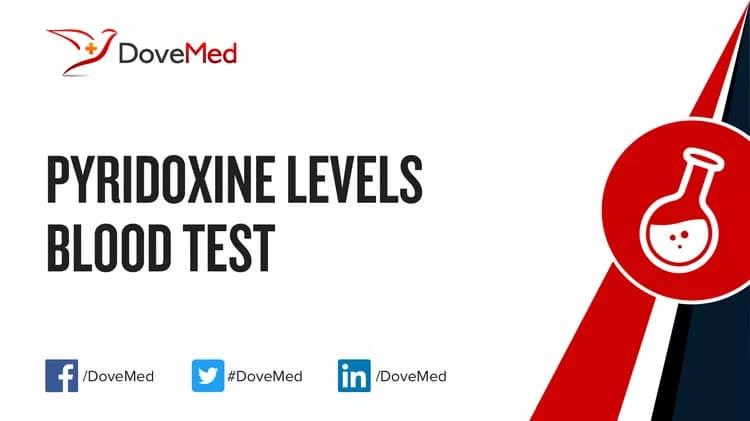What are the other Names for this Test? (Equivalent Terms)
- PL Levels Blood Test
- Pyridoxamine Levels Blood Test
- Pyridoxine 5’-Phosphate Levels Blood Test
What is Pyridoxine Levels Blood Test? (Background Information)
- Pyridoxine is one of the 3 forms (or vitamers) of vitamin B6. (The others being pyridoxal and pyridoxamine.) Vitamin B6 is part of the B vitamin complex, which is essential to energy production, tissue maintenance, and other processes
- Vitamin B6 is activated when a chemical group called ‘phosphate’ is attached to it. The resulting activated vitamin B6 is called pyridoxal phosphate (PLP)
- PLP is a cofactor required by enzymes to accomplish many different functions. These include metabolism, nervous system health, immune system health, red blood cell health, and the abilities of bodily cells to turn genetic information into proteins
- Pyridoxine is absorbed in the small intestine and is then metabolized in the liver and excreted through urine, because it is water-soluble. Generally, much more pyridoxine is absorbed than is needed; due to this abundance, pyridoxine deficiency is rarely observed
- Pyridoxine deficiency often arises when the body is deficient in other B vitamins, especially vitamin B2. This is because vitamin B2 is required for proper conversion of vitamin B6 into PLP
- The Pyridoxine Levels Blood Test determines the levels of pyridoxine in blood. It is used to diagnose vitamin B6 deficiency or toxicity
What are the Clinical Indications for performing the Pyridoxine Levels Blood Test?
Following are the clinical indications for performing the Pyridoxine Levels Blood Test:
- Presence of rashes above the mouth
- Discoloration of the back of the tongue
- Inflammation of the mouth, eye, and skin folds
- Fatigue
- Sleepiness
- Confusion
How is the Specimen Collected for Pyridoxine Levels Blood Test?
Following is the specimen collection process for Pyridoxine Levels Blood Test:
Sample required: Blood
Process of obtaining blood sample in adults:
- A band is wrapped around the arm, 3-4 inches above the collection site (superficial vein that lies within the elbow pit)
- The site is cleaned with 70% alcohol in an outward spiral, away from the zone of needle insertion
- The needle cap is removed and is held in line with the vein, pulling the skin tight
- With a small and quick thrust, the vein is penetrated using the needle
- The required amount of blood sample is collected by pulling the plunger of the syringe out slowly
- The wrap band is removed, gauze is placed on the collection site, and the needle is removed
- The blood is immediately transferred into the blood container, which has the appropriate preservative/clot activator/anti-coagulant
- The syringe and the needle are disposed into the appropriate “sharp container” for safe and hygienic disposal
Preparation required: No special preparation is needed prior to the test.
What is the Significance of the Pyridoxine Levels Blood Test Result?
Low pyridoxine blood levels may indicate:
- Asthma
- Carpal tunnel syndrome
- Gestational diabetes
- Malabsorption
- Malnutrition
- Neonatal seizures
- Hydrazine exposure
- Pellagra
- Preeclamptic edema
- Renal dialysis
- Uremia
The laboratory test results are NOT to be interpreted as results of a "stand-alone" test. The test results have to be interpreted after correlating with suitable clinical findings and additional supplemental tests/information. Your healthcare providers will explain the meaning of your tests results, based on the overall clinical scenario.
Additional and Relevant Useful Information:
- Certain factors interfere with the results of the Pyridoxine Levels Blood Test and these include alcohol consumption, asthma, breast-feeding, and diet
- Pyridoxine hydrochloride, a salt of pyridoxine, is used as a dietary supplement
- Foods rich in vitamin B6 include pork, fish, chicken, bananas, wheat germ, and legumes. However, pyridoxine is sensitive to heat, and cooking food beyond certain temperatures can destroy up to 50% of the pyridoxine content
- Pyridoxine is given to pregnant women to treat nausea and vomiting
Certain medications that you may be currently taking may influence the outcome of the test. Hence, it is important to inform your healthcare provider of the complete list of medications (including any herbal supplements) you are currently taking. This will help the healthcare provider interpret your test results more accurately and avoid unnecessary chances of a misdiagnosis.
Please visit our Laboratory Procedures Center for more physician-approved health information:
http://www.dovemed.com/common-procedures/procedures-laboratory/
Related Articles
Test Your Knowledge
Asked by users
Related Centers
Related Specialties
Related Physicians
Related Procedures
Related Resources
Join DoveHubs
and connect with fellow professionals


0 Comments
Please log in to post a comment.